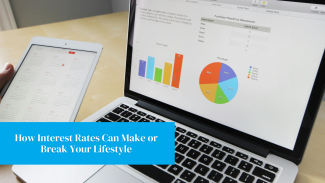
How Interest Rates Can Make or Break Your Lifestyle
How Interest Rates Can Make or Break Your Lifestyle
Throughout the years, the market has experienced regular periods of volatility. Periodically, the Federal Open Market Committee (FOMCC) reviews its monetary policy, which creates both worry and anticipation among consumers and businesses. Sometimes, the Fed decides to raise the interest rate to slow down the economy, lower it to stimulate it, or hold it steady instead of cutting it to mitigate the risk of increasing inflation. Here are the advantages and disadvantages of each to help you determine how rate changes might make or break your lifestyle.
Lifestyle considerations if rates stay the same
Pros of interest rates remaining the same
- Potentially positive news for investors.
Eight times per year, the FOMCC will meet to discuss the direction of the monetary policy. The seven members of the Board of Governors and five Federal Reserve Bank presidents then make decisions and occasionally projections. These forecasts may include, for example, potential rate cuts in the near future. After such announcements, the market may increase due to investor optimism. However, these are just predictions and may be different from what actually happens.
- Savings account rates could trend positively.
The central bank doesn’t immediately influence deposit rates; however, the account yields rise and fall with changes to the federal funds rate. Should top-yielding online savings accounts have high rates, that would be a huge plus for people trying to accumulate money through a savings account investment strategy.
- Consider putting money toward an emergency fund.
When savings accounts, for example, are returning above the rate of inflation, it might be a perfect time to consider working on an emergency fund.
- Lock in your rate now.
If it appears that rates have most likely maxed out, consider locking in the interest rate on a certificate of deposit (CD). In some instances, top-yielding CDs pay about as much as a high-yield savings account.
Cons of interest rates remaining the same
- There is no relief from the cost of borrowing.
When the Fed holds rates idle, consumers still must wait for relief from higher borrowing costs, primarily for credit cards, mortgages, and auto loans. Student loans are generally fixed, so most current student borrowers shouldn’t be affected. However, students taking out new direct federal loans may be subject to a higher rate.
- Steady rates with a projection of future decrease may lead to problems.
When rates are held steady but projected to decrease in the near future, this may lead to problems, including inflation and liquidity traps. Consumers and businesses may benefit from seeking help from their financial professionals to forecast and determine which steps to take to mitigate the risk of interest rate fluctuations, up or down.
Lifestyle considerations if rates increase.
Pros of increasing interest rates
- The economy slows down, and consumers don’t spend as freely, which helps to bring prices back down.
During times of inflation, prices tend to rise, leading consumers to face exorbitant costs for noticeable everyday necessities like gas and food.
- Savers can benefit as banks increase their yields during interest rate hikes.
Banks and other lenders tend to increase their yields during periods of soaring interest rates to drum up new deposits. If you have a savings account, your account could experience small gains.
- Demand for mortgages slows as mortgage rates rise. However, this tends to curb an increase in housing prices.
If you couldn’t afford a home before due to the excessive home prices, as they begin to drop, you may now be able to purchase the home of your dreams.
- You may want to consider refinancing your variable-interest loan to a fixed-interest loan to lock in the lower rate in case it is higher in the future.
You may not have considered refinancing your variable-rate loan, yet it is similar to refinancing a fixed-rate mortgage.
- Over the long term, rising interest rates may help to increase a bond portfolio.
If you invest in the bond market, an interest rate hike in the short term may negatively affect your bond portfolio. However, over the long term, you could experience an increase in your bond portfolio.
Cons of increasing interest rates
- A rise in the interest rate might send the economy into a recession.
As the economy slips into a recession and interest rates rise, there typically are fewer jobs, lower wages, and increased stress for people.
- Mortgage rates tend to rise, creating a slowdown in mortgage demand.
Increased mortgage rates create a slowdown in the housing market. Monthly mortgage payments can be less affordable and, therefore, less attractive to potential home buyers, and higher rates could discourage existing homeowners from exploring the market and putting their homes up for sale.
- It becomes more difficult for borrowers to get approved for new loans.
If your credit is lower than you want, lenders may be more apt to pass you over for borrowers with a better FICO score since they may want to lend less during a more volatile economy. You may also be offered lower loan amounts and be subject to higher payments.
- Your stock portfolio and retirement accounts may decrease.
Typically, the stock market and interest rates have an inverse relationship. As interest rates rise, share prices usually decrease. Share prices are affected because companies have to spend more on borrowing money, which impacts cash flow and, consequently, share price.
- Decisions made by the Fed tend to influence consumer purchasing power.
Goods and services become more pricey as the cost of borrowing becomes more expensive. This may impact your decision to buy a car, a home, or even a luxury item like a boat since the interest rates on the loans usually increase.
Lifestyle considerations if rates decrease.
Pros of decreasing interest rates
- Borrowing money becomes cheaper.
Consumers and businesses can borrow money more cheaply. This helps to hire employees, purchase equipment, make acquisitions, pay dividends, and buy back shares.
- Mortgage payments could be lower.
Low-interest rates on mortgages encourage first-time homebuyers to purchase a home or current homebuyers to refinance mortgages at a cheaper rate.
- Financing may be easier for eligible consumers.
Interest rates for necessities like cars and appliances become more attractive, enticing consumers to borrow at a lower rate.
Cons of decreasing interest rates
- The price of certain assets may be inflated.
A decrease in interest rates can inflate the prices of assets like stocks and real estate.
- Along with inflation, lower rates lead to liquidity traps.
A liquidity trap happens when investors and consumers hoard their cash instead of spending or investing it.
- Savers make less on interest bearing accounts.
A decrease in interest rates leads to lower interest amounts for savers since yields on certificates of deposit (CDs), bonds, and money market securities are low.
Consider consulting your financial professional
With so many moving parts and details, you should consider consulting a financial professional who can help you address missing any opportunities that can be had from changes to the interest rate. They can also help you modify your financial strategy and potentially spot and sidestep obstacles or events you may not have seen coming.
Important Disclosures:
The opinions voiced in this material are for general information only and are not intended to provide specific advice or recommendations for any individual. To determine which investment(s) may be appropriate for you, consult your financial professional prior to investing.
Investing involves risks including possible loss of principal. No investment strategy or risk management technique can guarantee return or eliminate risk in all market environments.
CD’s are FDIC Insured and offer a fixed rate of return if held to maturity.
Bonds are subject to market and interest rate risk if sold prior to maturity. Bond values will decline as interest rates rise and bonds are subject to availability and change in price.
All information is believed to be from reliable sources; however, LPL Financial makes no representation as to its completeness or accuracy.
Sources:
Survey: More Americans Are Carrying Debt, And Many Of Them Don't Know Their APRs | Bankrate
Why Interest Rates Affect Everyone (investopedia.com)
How Interest Rates Affect the U.S. Markets (investopedia.com)
40% of credit card debtors don't know interest rate, Bankrate finds (cnbc.com)
How Does A Recession Affect The Average Person? (forbes.com)
The Impact of Higher Interest Rates on the Housing Market | U.S. Bank (usbank.com)
How Interest Rate Changes Affect Debt | Bankrate
This article was prepared by LPL Marketing Soultions
LPL Tracking # 557093

